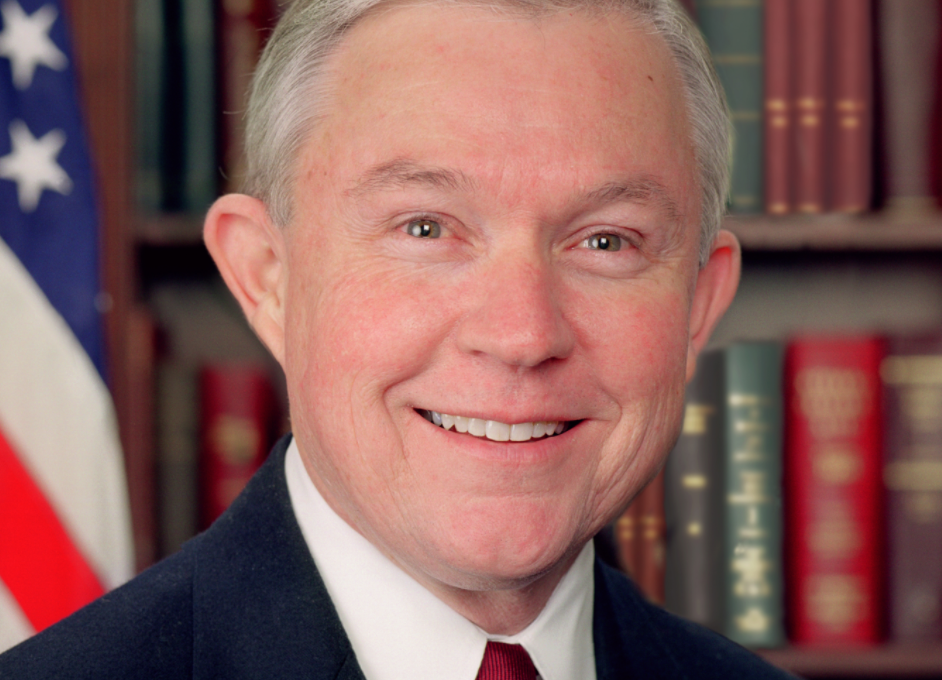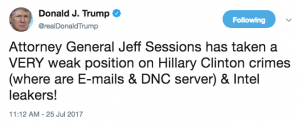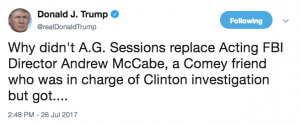George Conway (Kellyanne’s spouse, whom Trump considered to be Solicitor General) continues his habit of criticizing Trump from a conservative legal stance. This time, he joins Neal Katyal, author of the Special Counsel regulations under which Mueller operates, to argue that Trump’s appointment of Matt Whitaker is unconstitutional because Trump can’t name someone who hasn’t been Senate confirmed when a Senate confirmed candidate is available. The whole op-ed — which relies on a recent Clarence Thomas concurrence — is worth reading, but my favorite line is where they call Whitaker a constitutional nobody.
We cannot tolerate such an evasion of the Constitution’s very explicit, textually precise design. Senate confirmation exists for a simple, and good, reason. Constitutionally, Matthew Whitaker is a nobody. His job as Mr. Sessions’s chief of staff did not require Senate confirmation. (Yes, he was confirmed as a federal prosecutor in Iowa, in 2004, but President Trump can’t cut and paste that old, lapsed confirmation to today.) For the president to install Mr. Whitaker as our chief law enforcement officer is to betray the entire structure of our charter document.
I’m just as interested in what three rising Democratic House Chairs (House Judiciary Committee’s Jerrold Nadler, HPSCI’s Adam Schiff, and Oversight and Government Reform’s Elijah Commings) did, along with Dianne Feinstein. In the wake of Jeff Sessions’ resignation, they sent letters to every relevant department warning them to preserve all records on the Mueller investigation and Sessions’ departure. In their press release, they referred to Sessions departure not as a resignation, but as a firing.
Last night, House Judiciary Committee Ranking Member Jerrold Nadler (D-NY), Intelligence Committee Ranking Member Adam Schiff (D-CA), Oversight and Government Reform Committee Ranking Member Elijah Cummings (D-MD), and Senate Judiciary Committee Ranking Member Dianne Feinstein sent letters to top Administration officials demanding the preservation of all documents and materials relevant to the work of the Office of the Special Counsel or the firing of Attorney General Jeff Sessions.
In their letters, the Members wrote: “Committees of the United States Congress are conducting investigations parallel to those of the Special Counsel’s office, and preservation of records is critical to ensure that we are able to do our work without interference or delay. Committees will also be investigating Attorney General Sessions’ departure. We therefore ask that you immediately provide us with all orders, notices, and guidance regarding preservation of information related to these matters and investigations.”
Letters were sent to the White House Counsel Pat Cipollone, FBI Director Chris Wray, Director of National Intelligence Dan Coats, CIA Director Gina Haspel, Deputy U.S. Attorney for the Southern District of New York Robert Khuzami, Treasury Secretary Steven Mnuchin, NSA Director Paul Nakasone, IRS Commissioner Charles Rettig, and Acting Attorney General Matt Whitaker. [my emphasis]
Even the letters themselves, while they don’t use the word “firing,” emphasize the involuntary nature of Sessions’ ouster.
Our understanding is that Attorney General Jeff Sessions has been removed at the request of the President. We ask that you confirm that the Justice Department has preserved all materials of related to any investigations by the Special Counsel’s office, including any related investigations conducted by any component of the Justice Department. We also ask that you preserve all the materials related to the departure of Attorney General Sessions.
While it’s not clear whether they more basis to believe this was a firing rather than a resignation, they’re proceeding as if it was, legally, a firing. That’s crucial because the only way that Whitaker’s appointment, as someone who is not Senate confirmed, would be legal under the Vacancies Reform Act is if Sessions legally resigned. The Democrats seem to suspect they can argue he did not.
And that’s important because (as Katyal and Conway argue) if his appointment is not legal, than nothing he does as Attorney General is valid.
President Trump’s installation of Matthew Whitaker as acting attorney general of the United States after forcing the resignation of Jeff Sessions is unconstitutional. It’s illegal. And it means that anything Mr. Whitaker does, or tries to do, in that position is invalid.
Plus, by demanding preservation of the records and framing this in terms that suggest Whitaker’s appointment was not legal (I’m not sure I agree, but encourage HJC to ask Katyal and Conway to argue the case for them), HJC lays out a basis to claim standing to challenge this, particularly if and when Whitaker makes a decision (such as preventing HJC from obtaining any report Mueller writes) that will cause them injury as an independent branch of government.
Again, I’m not sure I agree with the Katyal/Conway legal argument, though if HJC can prove that Sessions was fired then it’s clear Whitaker was not legally appointed. But these two challenges pose a real risk for Trump. It risks not just decisions pertaining to the Mueller investigation, but even things like surveillance approvals, can be challenged by anyone harmed by them (who gets notice of it). That’s an unbelievable risk for a position as important as Attorney General.
Back when a guy named Robert Mueller had his FBI tenure extended two years in 2011, Tom Coburn worried that even that action, done with Senate approval, would make the approvals Mueller made under Section 215 (this was before we knew the scope of the phone dragnet) legally suspect.
Could you envision colorable challenge to use of 215 authority during your 2 year extension of power?
While I have no problem with you staying on for two more years, I do have concerns we could get mired in court battles [over 215] that would make you ineffective in your job.
Coburn was worried about one (or a few) surveillance programs. The Attorney General touches far more than the FBI Director, and Trump’s DOJ could spend just as much time in court trying to defend the actions of his hatchetman.
And it looks like both the author of the statute governing Mueller’s appointment and the people who will oversee DOJ in a few months have real questions about the legality of Whitaker’s appointment.






